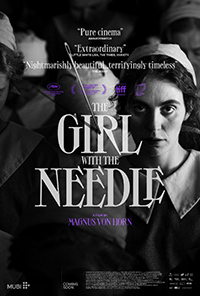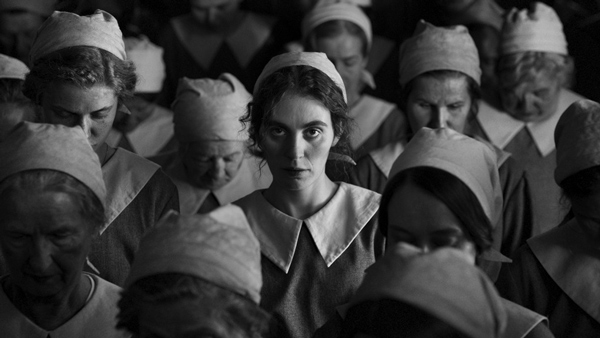Casa de los Babys: von Horn Hits a Bleak Streak
 You know you’re in for something dark and dreary when a film opens upon a character in a world where despair has coagulated into grim apathy. Such is the case with Swedish filmmaker Magnus von Horn’s third feature, The Girl with the Needle. A sinister title ushers us into 1919 Copenhagen. While Denmark didn’t take part in WWI, the degrading effects of the war hasn’t left the country’s morale unscathed—though Germany’s surrender only suggests life will go on as wearily as before for those of the working class. A tattered young woman who makes a few poor decisions becomes the lethargic focus, and circumstances will lead her into the arms of a woman who may debatably be a monster. Increasingly sinister and ultimately quite profound, its grotesqueness feels too familiar for the confirmatory ‘based on true events’ statement to feel at all surprising, dashed across the screen like a terse smirk before the end credits.
You know you’re in for something dark and dreary when a film opens upon a character in a world where despair has coagulated into grim apathy. Such is the case with Swedish filmmaker Magnus von Horn’s third feature, The Girl with the Needle. A sinister title ushers us into 1919 Copenhagen. While Denmark didn’t take part in WWI, the degrading effects of the war hasn’t left the country’s morale unscathed—though Germany’s surrender only suggests life will go on as wearily as before for those of the working class. A tattered young woman who makes a few poor decisions becomes the lethargic focus, and circumstances will lead her into the arms of a woman who may debatably be a monster. Increasingly sinister and ultimately quite profound, its grotesqueness feels too familiar for the confirmatory ‘based on true events’ statement to feel at all surprising, dashed across the screen like a terse smirk before the end credits.
Karoline (Vic Carmen Sonne, of Isabella Eklof’s Holiday, 2018) is frustratingly dead-behind-the-eyes as we meet her during an eviction for unpaid rent. One almost gets the sense she’s relieved to lose the battle with her landlord, perhaps as a means to give up. But he kindly refers her to more affordable quarters elsewhere. Her husband has been missing for some time, and though he’s believed to be dead, she cannot collect public assistance as a widow without a death certificate. But the overseer of the factory (Joachim Fjelstrup) where she works as a seamstress, who is maimed but handsome, takes a liking to her. Initially, this seems to be Karoline’s chance to marry upwards into a wealthy, business owning family. Suddenly, her husband Peter (Besir Zeciri) turns up, having suffered a catastrophic accident which has severely deformed his face, covered by a garish mask he utilizes in public. Karoline kicks him to the curb, professing her love for another man.

Unfortunately, her affair leaves her pregnant and without a job, and the needle of the title makes an appearance when she tries to give herself an abortion at the public bath. Luckily, she’s intercepted by Dagmar Overby (Trine Dyrholm), bathing with her seven-year-old daughter Erena. Had Karoline been caught, she could have been imprisoned. Dagmar, who runs a local candy shop, explains that, for a price, she will take Karoline’s baby when it’s born and have it placed in a secret foster home, an operation she has been engaged with for quite some time. The big day comes and Dagmar lives up to her promise. But the women seem to share a certain kinship, with Dagmar recognizing a tenacity in Karoline, perhaps. The younger woman is also lactating, which seems to be as good a reason as any to keep Karoline around for the other infants floating in and out of her service (not to mention Erena seemingly enjoys being breastfed as well, for an extra dollop of dysfunction). But after some time passes and Karoline becomes too emotionally connected to an infant awaiting placement, she discovers Dagmar’s horrific secret.
While the film is almost unceasingly morose, there’s a wretched griminess to The Girl with the Needle which makes it utterly compelling. Arguably, we spend a bit too much time in Karoline’s initial squalor, though von Horn quietly builds a sense of distrust towards her employer, who insists on copulating in open alleys a la Jessica Lange and Robert De Niro in Night and the City (1992). In other words, this is not a man who has any real intention of convincing his mother of her worth. The film comes to life, so to speak, when an eerie Trine Dyrholm unfurls her wings, resembling Miss Almira Gulch as she carts infants in prams down the cobblestones of Copenhagen. She’s alarmingly dependent on ether to soothe her nerves, a habit which Karoline quickly develops herself. But we’ve never quite seen Dyrholm in this fashion before, eventually revealed to be not unlike the WWII abortionist played by Isabelle Huppert in Claude Chabrol’s similarly blunt The Story of Women (1988).
The film is a far cry from von Horn’s 2020 title Sweat (read review), in which a personal trainer discovers she yearns for an intimacy she cannot obtain, but returning DP Michal Dymek (who also lensed Jerzy Skolimowski’s visual stunner EO, 2022) creates a bleakness which feels like Jan Troell meets Arturo Ripstein. Although von Horn allows for a slight moment of grace in the film’s closing moments, The Girl with the Needle is an unavoidably depressing saga, and yet a reminder of the clandestine scenarios devised when we’re not realistic about human behaviors or needs when women are not allowed to make decisions about their bodies.
Reviewed on May 15th at the 2024 Cannes Film Festival – Competition. 115 Mins
★★★½/☆☆☆☆☆


